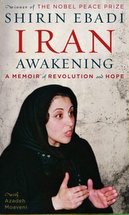Iran Awakening by Shirin Ebadi
 This was a quick read and definitely interesting. Even more than Reading Lolita in Tehran, it gave me a sense of what Iran is really like—and especially what it’s been like since the Islamic Revolution in 1979.
This was a quick read and definitely interesting. Even more than Reading Lolita in Tehran, it gave me a sense of what Iran is really like—and especially what it’s been like since the Islamic Revolution in 1979.Shirin Ebadi won the Novel Peace Prize for her work as a lawyer and activist redressing the wrongs done to women and children in Iran. The book recounts her life and yet it seems deliberately to shy away from herself as a person. We know what she did, but only superficially how she felt. Reading the book, one might cry at the horrible situations she tried to redress (like a family of a murdered girl who had to raise the money to pay for the execution of the murderer after he’d been convicted, or the woman who wanted redress for the brutal deaths of her elderly dissident parents) but Ebadi is very circumspect about her own emotions. When she’s hauled off to prison she is still “accentuating the positive” even as she recounts her thoughts and feelings. There’s very little personal anger in the book (even though she faced situations that would make most women angry and bitter for life), and I suspect that’s the key to her having been so successful operating within a repressive Islamic republic and yet making significant progress toward peace and fairness for all citizens.
The book starts with the time she and other lawyers were given actual documents which might be able to prove that the government had hired assassinations to rid them of dissidents and other troublesome citizens. Even though the lawyers were given a time limit of 10 days to go through thousands and thousands of pages of documents without being allowed to photocopy or take notes, they realized that this was a breakthrough they could not pass up. The shock was when she found a document in which she herself had been named as a target for assassination.
She was born in 1947, the second daughter of what seems a fairly well-to-do middle class—certainly professional class—family. Her father had been in the government official and she had a relatively secular childhood. Her life sounded not unlike my own growing up in roughly the same time period—photographs show she wore pigtails and Peter Pan collars. She went to university to study law and became at judge at 23. (In the Iranian system one did not have to practice law before becoming a judge.) She grew up revering Mohammed Mossadegh, an effective Iranian prime minister who was dismissed when the US installed the latest Shah in 1953. She hated the profligate Shah and his minions and supported the Islamic Revolution of the Ayatollah Khomeini, not realizing that “freedom” for her country would significantly limit her personal freedom. (After all, she was a woman and as such only worth half of a man.)
She refused to quit her job as a judge when other women were harassed into doing so and when she was demoted, effectively, to the secretarial pool, she went to work every day and did what she was told. She did eventually resign but went back to work as a lawyer when that became possible, specializing in cases where women or children were unfairly treated. She took the most high profile cases pro bono, intending not only to work for the client but for changes in the laws that made such discrimination lawful. Eventually she gave up her paid clients completely. She was once thrown out of parliament where she had written a divorce law at the request of women members of that body. Questioned by a ruling cleric, she was able to justify her stance based on laws and textbooks taught to the mullahs. He couldn’t argue with her, but he could have her ousted from the building.
She’s an interesting character, whom you won’t feel like you know after reading this book, but will still be interested in. She was constantly satisfied with "some progress" rather than success in every effort. It built up over the years into a daunting reputation.


0 Comments:
Post a Comment
<< Home